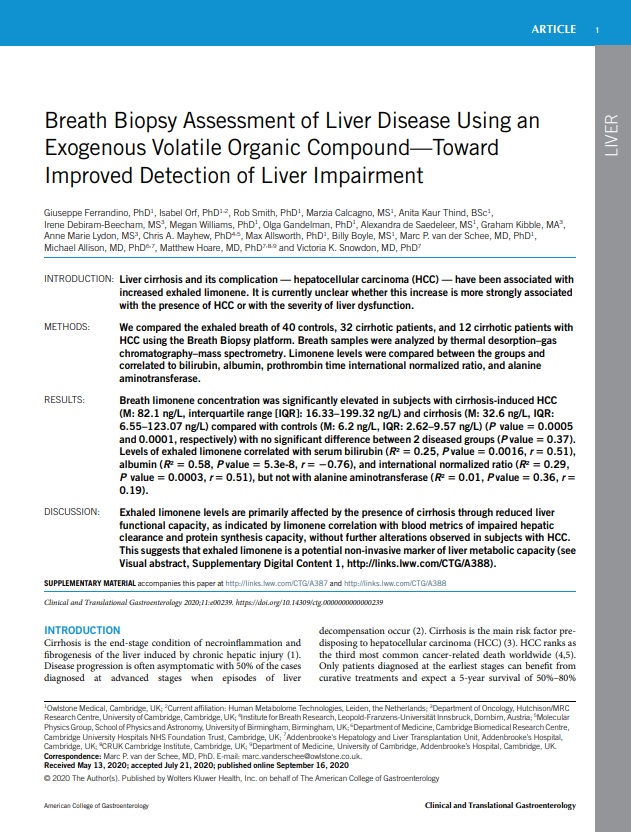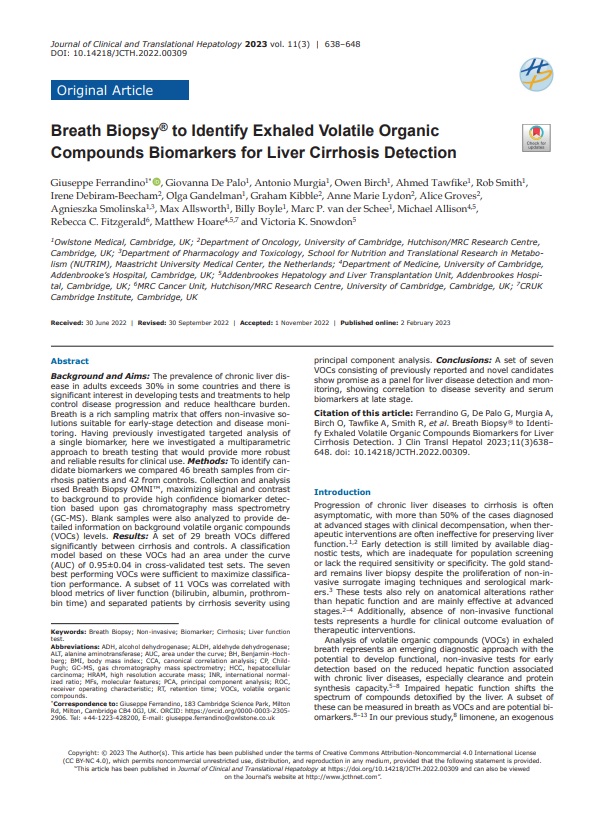Pan-Cancer Early Detection Study (PAN-Study)
Study code
CBR192
Lead researcher
Professor Rebecca Fitzgerald
Study type
Participant re-contact
Institution or company
Cambridge University Hospital NHS Foundation Trust
Researcher type
Academic
Speciality area
Cancer
Recruitment Site
Cambridge

Summary
Cancer affects 1 in 2 people at some point during their life. The earlier the disease is detected the easier it is to treat it. However, detecting certain types of cancer early is not easy as there are often very few symptoms.
Recent research has shown that cells inside the body produce substances that end up in the lungs and are breathed out or ‘exhaled’. These studies have shown that those substances may be different if someone has cancer.
The goal of this study is to look carefully at the compounds someone exhales to determine if analysis of exhaled breath can detect cancer. The breath test is not invasive and it’s easy to perform. It could therefore be a good tool to screen people at risk of cancer. This study will help us to determine if a breath test for cancer can be developed. Such a test could help to treat the disease earlier and save lives.
The volunteers in the study, would be asked to perform a breathing test. For this, they will be asked to breathe normally into a facemask for 10 to 15 minutes.
Volunteers will provide an initial breath sample, then a second breath sample after ingesting an off-the-shelf peppermint oil food supplement, which is completely harmless. The active ingredients in the peppermint oil capsule will be absorbed in the body and observed in the exhaled breath this will allow us to investigate the differences in substances in exhaled breath depending on the metabolism of each individual.
The healthy volunteers will not undergo any procedures other than breath collections, collection of clinical metadata and a telephone-based follow up at 6 months.
Participation: For this study we recruited 42 volunteers from the Cambridge BioResource to give provide a breath sample and answer a questionnaire.
Organisation: This study is organised by Professor Rebecca Fitzgerald from Cambridge University Hospitals NHS and Owlstone Medical.
Publications arising from this study:-
Publication 1
Ferrandino G, Orf I, Smith R, et al. (2020). 'Breath Biopsy Assessment of Liver Disease Using an Exogenous Volatile Organic Compound-Toward Improved Detection of Liver Impairment.' Clin Transl Gastroenterol. 2020 Sep;11(9):e00239. (link)
Summary
Liver cirrhosis and its complication - hepatocellular carcinoma (HCC) - have been associated with increased exhaled limonene. It is currently unclear whether this increase is more strongly associated with the presence of HCC or with the severity of liver dysfunction. In this study, exhaled limonene levels are primarily affected by the presence of cirrhosis through reduced liver functional capacity, as indicated by limonene correlation with blood metrics of impaired hepatic clearance and protein synthesis capacity, without further alterations observed in subjects with HCC. This suggests that exhaled limonene is a potential non-invasive marker of liver metabolic capacity.

Publication 2
Ferrandino G, De Palo G, Murgia A, et al. (2023). 'Breath Biopsy® to Identify Exhaled Volatile Organic Compounds Biomarkers for Liver Cirrhosis Detection.' J Clin Transl Hepatol. Jun 28;11(3):638-648. (link)
Summary
The prevalence of chronic liver disease in adults exceeds 30% in some countries and there is significant interest in developing tests and treatments to help control disease progression and reduce healthcare burden. Breath is a rich sampling matrix that offers non-invasive solutions suitable for early-stage detection and disease monitoring. Having previously investigated targeted analysis of a single biomarker, here we investigated a multiparametric approach to breath testing that would provide more robust and reliable results for clinical use. Our findings show a set of seven volatile organic compounds consisting of previously reported and novel candidates show promise as a panel for liver disease detection and monitoring, showing correlation to disease severity and serum biomarkers at late stage.
